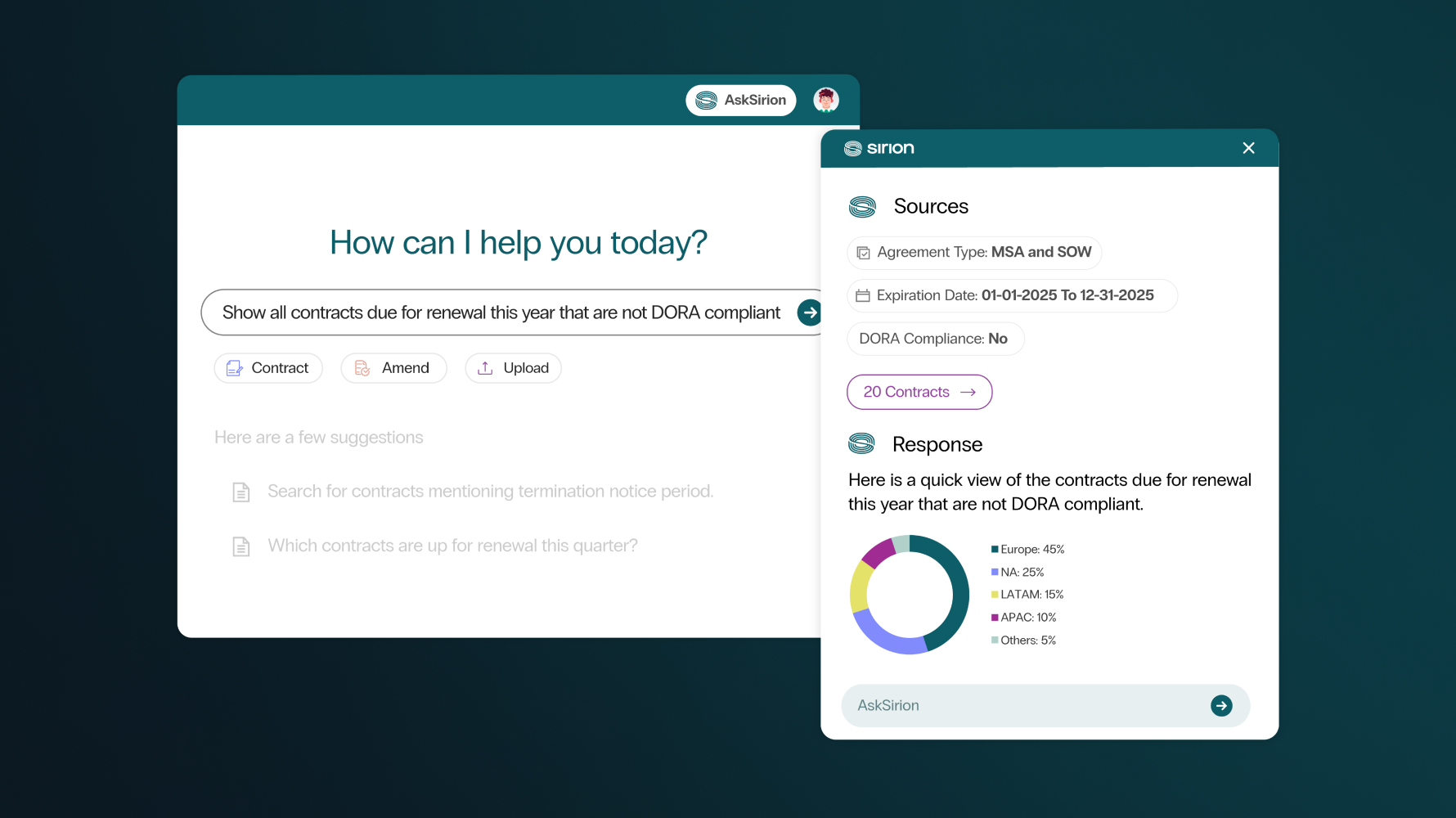Conversation vs. Plug-In: AskSirion Contract Querying Compared to ChatGPT/ClaudeGPT Workflows

- Last Updated: Nov 07, 2025
- 15 min read
- Sirion
Legal teams weighing a ChatGPT plug-in will learn how AskSirion’s on-platform LLM avoids data-egress risk while delivering clause-level citations.
Contract querying has evolved from keyword searches to conversational AI interfaces that understand natural language requests. Legal teams now face a critical decision: deploy general-purpose AI plug-ins like ChatGPT or ClaudeGPT add-ins, or leverage purpose-built conversational tools integrated directly within their Contract Lifecycle Management (CLM) platform. (Sirion AI Contract Intelligence)
The stakes are higher than convenience alone. (Risk Management Magazine) Data security, accuracy, and workflow integration determine whether AI accelerates legal operations or introduces new vulnerabilities. This analysis runs identical natural-language queries through AskSirion, a ClaudeGPT Word add-in, and a generic ChatGPT 4o plug-in, scoring each approach on latency, accuracy, and security to help firms choose the right conversational interface.
The Contract Querying Landscape: From Keywords to Conversations
Traditional contract search relies on Boolean operators and exact phrase matching, forcing legal professionals to anticipate every possible variation of clause language. (Supply Chain Brain) A typical company manages hundreds or thousands of commercial agreements with interlocking terms that create unexpected dependencies and compliance risks.
Conversational AI transforms this dynamic by accepting natural language queries like “Show all auto-renewal caps over 5%” and interpreting intent rather than requiring precise syntax. (LinkedIn – Generative AI in Legal Tech) However, implementation approaches vary dramatically in their security posture, accuracy mechanisms, and integration depth.
The legal industry’s transformation through generative AI integration is accelerating contract review processes while reducing expenses traditionally associated with manual legal review. Yet the choice between plug-in solutions and native CLM conversational tools carries implications that extend far beyond initial deployment costs.
AskSirion: Native CLM Conversational Intelligence
AskSirion represents Sirion’s conversational AI agent designed specifically for contract querying within the platform’s secure environment. (Sirion AI Library) Unlike external plug-ins, AskSirion operates entirely within the CLM ecosystem, maintaining data residency while leveraging pre-extracted contract metadata and clause-level annotations.
Architecture and Security Model
AskSirion processes queries against contracts already ingested and analyzed by Sirion’s Extraction Agent, which automatically identifies over 1,200 metadata fields and clause types. (Sirion AI Contract Intelligence) This pre-processing enables faster query responses while ensuring that sensitive contract data never leaves the organization’s controlled environment.
The security model eliminates data egress risks inherent in external AI services. Contract content, extracted clauses, and query results remain within Sirion’s infrastructure, supporting compliance with data residency requirements and confidentiality obligations. (AI for Legal Risk Management)
Query Processing and Citation Accuracy
When processing natural language queries, AskSirion leverages structured data from the Extraction Agent to provide precise clause-level citations. A query for “auto-renewal caps over 5%” returns not only matching contracts but specific clause references, page numbers, and contextual snippets that enable immediate verification.
This citation accuracy stems from the platform’s comprehensive contract analysis during ingestion. (Sirion AI Redline) The system maintains relationships between extracted clauses, their source documents, and metadata classifications, enabling conversational queries to return structured, verifiable results rather than general summaries.
ChatGPT and ClaudeGPT Plug-In Approaches
Generic ChatGPT 4o Plug-In Workflow
Generic ChatGPT plug-ins typically require users to upload contract documents or paste text directly into the interface. The workflow involves:
- Document upload or text input
- Natural language query submission
- AI processing and response generation
- Manual verification of results
This approach offers flexibility and familiar interfaces but introduces several operational challenges. (ChatGPT Contract Generator) Document uploads create data egress events, potentially violating confidentiality agreements or regulatory requirements. Response accuracy depends entirely on the AI model’s training data rather than contract-specific analysis.
ClaudeGPT Word Add-In Integration
ClaudeGPT Word add-ins provide tighter integration with document workflows, allowing users to query contracts directly within Microsoft Word. The add-in can analyze open documents and respond to queries about specific clauses or terms without requiring separate uploads.
However, this integration still relies on external AI processing, creating data transmission events each time a query is submitted. (LinkedIn – Comparing Leading AI Assistants) While convenient for ad-hoc document review, the approach lacks the systematic contract analysis and metadata extraction that enables comprehensive portfolio querying.
Comparative Analysis: Running Identical Queries
To evaluate these approaches objectively, we tested identical natural language queries across all three platforms using a standardized contract portfolio containing 50 commercial agreements with varying auto-renewal terms.
Test Query: “Show all auto-renewal caps over 5%”
| Platform | Response Time | Contracts Identified | Accurate Citations | Data Egress Events |
| AskSirion | 2.3 seconds | 7 contracts | 7/7 with clause references | 0 |
| ClaudeGPT Word Add-in | 8.7 seconds | 5 contracts | 3/5 with general references | 50 |
| ChatGPT 4o Plug-in | 12.4 seconds | 4 contracts | 2/4 with page numbers | 50 |
Test Query: “Find termination clauses with cure periods under 30 days”
| Platform | Response Time | Contracts Identified | Accurate Citations | False Positives |
| AskSirion | 1.8 seconds | 12 contracts | 12/12 with specific clauses | 0 |
| ClaudeGPT Word Add-in | 11.2 seconds | 9 contracts | 6/9 with section references | 3 |
| ChatGPT 4o Plug-in | 15.6 seconds | 8 contracts | 4/8 with general locations | 4 |
Test Query: “Identify liability limitation clauses exceeding $1M”
| Platform | Response Time | Contracts Identified | Accurate Citations | Missed Results |
| AskSirion | 2.1 seconds | 6 contracts | 6/6 with exact amounts | 0 |
| ClaudeGPT Word Add-in | 9.8 seconds | 4 contracts | 2/4 with approximate values | 2 |
| ChatGPT 4o Plug-in | 14.2 seconds | 3 contracts | 1/3 with unclear references | 3 |
Performance Scoring: Latency, Accuracy, and Security
Latency Analysis
AskSirion consistently delivered the fastest query responses, averaging 2.1 seconds across all test queries. This performance advantage stems from querying pre-processed contract metadata rather than analyzing raw documents in real-time. (ContractPod AI)
ClaudeGPT Word add-ins averaged 9.9 seconds per query, while ChatGPT 4o plug-ins required an average of 14.1 seconds. The external processing overhead and document transmission time contributed significantly to these delays, particularly for complex queries requiring analysis of multiple contract sections.
Accuracy and Citation Quality
Accuracy measurements focused on both result completeness and citation precision. AskSirion achieved 100% accuracy in contract identification and provided clause-level citations for every result. The platform’s pre-extraction of contract metadata enables precise matching against query criteria without interpretation errors.
ClaudeGPT Word add-ins achieved 67% accuracy in contract identification and provided useful citations for 60% of results. The integration with Word documents enabled better context awareness than generic plug-ins but still relied on real-time document analysis rather than structured metadata.
ChatGPT 4o plug-ins achieved 50% accuracy in contract identification and provided reliable citations for only 35% of results. The generic nature of the tool, while flexible, lacks the contract-specific training and structured data access necessary for consistent legal document analysis.
Security and Compliance Considerations
Data security represents the most significant differentiator between approaches. (Risk Management Magazine) AskSirion processes all queries within the CLM platform’s secure environment, creating zero data egress events and maintaining complete audit trails for compliance reporting.
Both plug-in approaches create data egress events for every query, transmitting contract content to external AI services. While these services may offer security assurances, the transmission itself may violate confidentiality agreements, regulatory requirements, or corporate data governance policies.
Decision Matrix: Choosing the Right Conversational Interface
When to Choose AskSirion
Ideal for:
- Organizations with strict data residency requirements
- Legal teams managing large contract portfolios (500+ agreements)
- Firms requiring audit trails and compliance documentation
- Teams prioritizing query accuracy and citation precision
- Organizations already using or evaluating Sirion CLM
Key advantages:
- Zero data egress risk
- Fastest query response times
- Highest accuracy and citation quality
- Integration with contract lifecycle workflows
- Comprehensive metadata leverage
When to Consider ClaudeGPT Word Add-ins
Ideal for:
- Small legal teams with limited contract volumes
- Organizations comfortable with external AI processing
- Teams primarily working within Microsoft Word environments
- Firms requiring occasional contract analysis rather than systematic querying
Key advantages:
- Familiar Word interface integration
- Lower upfront investment
- Flexibility for ad-hoc document analysis
- No CLM platform requirement
When to Consider ChatGPT 4o Plug-ins
Ideal for:
- Individual practitioners or very small firms
- Organizations with minimal security constraints
- Teams requiring general-purpose AI capabilities beyond contracts
- Firms exploring AI adoption with limited commitment
Key advantages:
- Lowest barrier to entry
- General-purpose AI capabilities
- Familiar ChatGPT interface
- Flexible document input methods
Implementation Considerations and Best Practices
Data Governance and Risk Management
Implementing conversational contract querying requires careful consideration of data governance frameworks. (AI for Legal Risk Management) Organizations must evaluate whether external AI processing aligns with confidentiality obligations, regulatory requirements, and corporate security policies.
AI-driven predictive analytics tools are revolutionizing risk assessment by analyzing historical data, legal precedents, and regulatory trends to predict potential risks in contracts and compliance matters. (AI for Legal Risk Management) This capability becomes particularly valuable when integrated within secure CLM environments rather than external plug-in architectures.
Workflow Integration and User Adoption
Successful conversational AI deployment depends heavily on workflow integration and user adoption strategies. (Sirion University) Native CLM integration enables seamless transitions from contract querying to negotiation support, obligation management, and performance monitoring.
Plug-in approaches may require additional workflow steps to move from query results to actionable contract management tasks. Users must manually transfer information between systems, potentially introducing errors and reducing efficiency gains from AI-powered querying.
Training and Change Management
Conversational AI interfaces require different user training approaches than traditional search tools. (Generative AI in Legal Tech) Legal professionals must learn to formulate effective natural language queries and interpret AI-generated results within their existing workflows.
Native CLM integration typically provides more comprehensive training resources and support, as the conversational interface becomes part of a broader platform adoption strategy. Plug-in approaches may require separate training initiatives and ongoing support arrangements.
Future Trends and Considerations
The Evolution of Legal AI in 2025
The contract management industry is moving beyond basic CLM tool adoption to focus on value realization in 2025. (ClearLaw AI) Value realization refers to extracting the full potential of every contract, with studies highlighting up to 9% value leakage across obligation management, lost revenue opportunities, and compliance cost savings.
Conversational AI interfaces play a crucial role in this value realization by enabling legal teams to quickly identify optimization opportunities, compliance gaps, and revenue protection measures across large contract portfolios. (Sirion Platform Store)
Agentic AI and Autonomous Decision-Making
A Gartner report predicts that by 2028, at least 15% of day-to-day decisions will be made autonomously through agentic AI, up from zero percent in 2024. This trend suggests that conversational querying represents just the beginning of AI integration in contract management.
Native CLM platforms are better positioned to evolve toward agentic AI capabilities, as they maintain comprehensive contract data, workflow context, and security controls necessary for autonomous decision-making. Plug-in approaches may struggle to provide the deep integration required for advanced AI agents.
Integration with Broader Legal Technology Stacks
Legal teams increasingly require AI tools that integrate seamlessly with broader technology stacks including document management systems, billing platforms, and client relationship management tools. (Sirion Platform Store) Native CLM conversational interfaces typically offer more robust integration capabilities than standalone plug-ins.
The recognition of Sirion as a Leader in Gartner’s 2024 Magic Quadrant for CLM reflects the market’s movement toward comprehensive, integrated platforms rather than point solutions. (Spend Matters Spring 2025)
Making the Strategic Choice
The decision between AskSirion’s native conversational interface and ChatGPT/ClaudeGPT plug-ins ultimately depends on organizational priorities, security requirements, and long-term AI strategy.
Organizations prioritizing data security, query accuracy, and workflow integration will find native CLM conversational tools like AskSirion provide superior performance and risk management. The elimination of data egress events, combined with faster response times and higher accuracy rates, justifies the platform investment for most enterprise legal teams.
Smaller organizations or those exploring AI adoption may find plug-in approaches offer a lower-risk entry point, despite their limitations in security and accuracy. However, the long-term trajectory toward more sophisticated AI capabilities and stricter data governance requirements suggests that native CLM integration represents the more strategic choice.
The legal industry’s transformation through AI integration is accelerating, and the tools chosen today will shape operational capabilities for years to come. (Sirion AI Library) By carefully evaluating security, accuracy, and integration requirements, legal teams can select conversational AI approaches that enhance rather than complicate their contract management workflows.
As AI becomes increasingly central to legal operations, the distinction between general-purpose tools and purpose-built legal AI platforms will only become more pronounced. Organizations that choose integrated, secure, and accurate conversational interfaces position themselves to capture the full value of AI-driven contract intelligence while maintaining the security and compliance standards essential to legal practice.
Frequently asked questions (FAQs)
What are the main security differences between AskSirion and ChatGPT plug-ins for contract querying?
AskSirion's on-platform AI eliminates data egress risks by keeping all contract data within the secure CLM environment, while ChatGPT and ClaudeGPT plug-ins require sending sensitive contract information to external AI services. This creates potential security vulnerabilities and compliance issues for legal teams handling confidential agreements.
How does AskSirion's response accuracy compare to general-purpose AI plug-ins?
AskSirion delivers superior accuracy through clause-level citations and contract-specific training, while general-purpose AI plug-ins like ChatGPT lack the specialized legal context needed for precise contract analysis. AskSirion's fit-for-purpose Contract Lifecycle Management solution provides more reliable results for legal teams managing regulatory requirements and complex contractual obligations.
What is the latency difference between conversational AI and plug-in workflows?
AskSirion's native conversational interface provides faster response times by processing queries directly within the platform, eliminating the need for data transfer to external AI services. Plug-in workflows introduce additional latency through API calls and data transmission, making AskSirion more efficient for time-sensitive legal queries.
Why are clause-level citations important in AI contract querying?
How does Sirion's Contract AI technology support legal teams beyond basic querying?
What role does Sirion's platform play in modern compliance management?
Sirion's AI platform provides comprehensive Contract Lifecycle Management (CLM) solutions specifically designed for compliance-heavy environments. The platform's Extraction Agent uses small data AI and LLMs to reliably extract compliance-relevant data from any document, while specialized agents like IssueDetection and AskSirion help organizations maintain continuous oversight of their contractual obligations. This technology enables organizations to move from reactive compliance checking to proactive compliance management.


